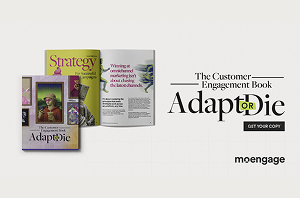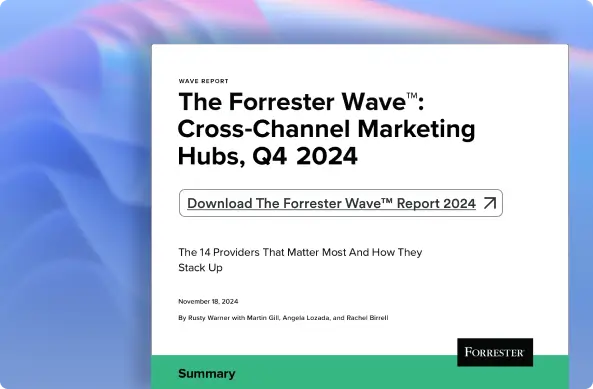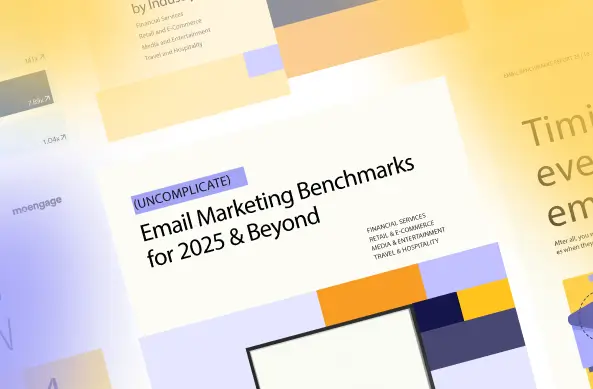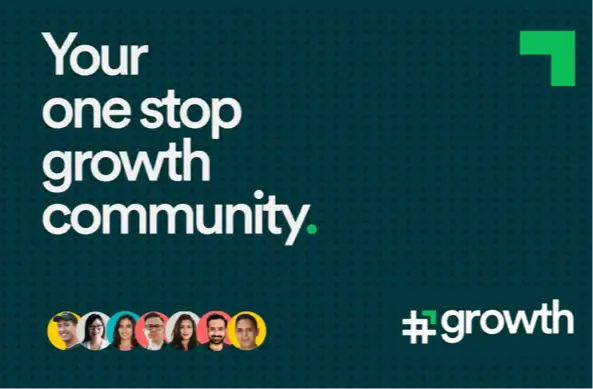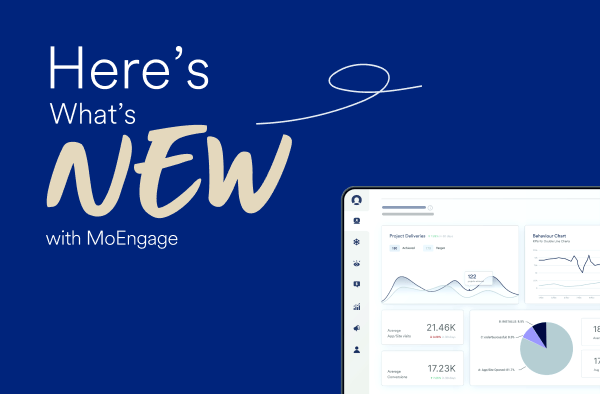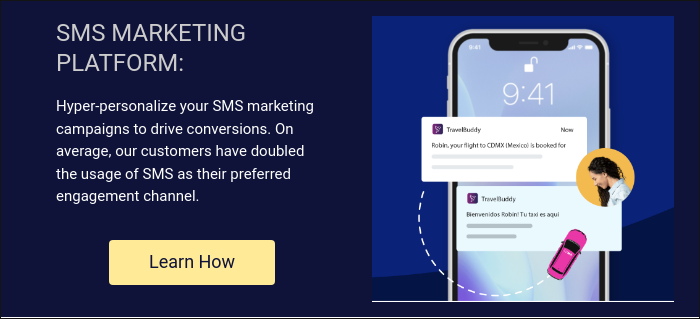Automated Text Messages for Business: A Marketer’s Guide
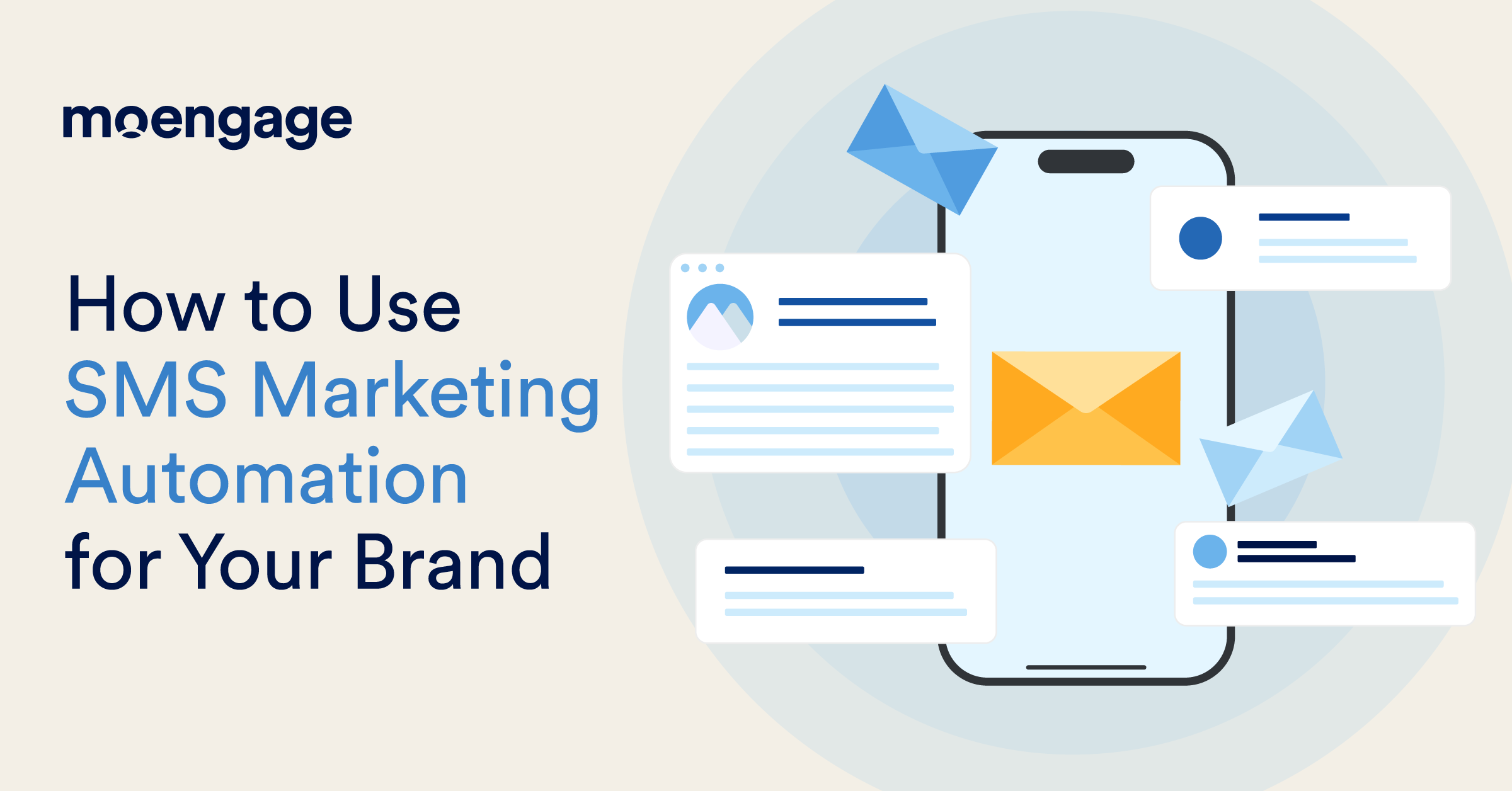
Reading Time: 9 minutes
Did you know SMS open rates are as high as 98%, with 45% replying to branded SMS marketing? As texting continues to witness a steady rise, your brand could be missing out if you’re not leveraging automated text messaging for business!
Text messaging is when your brand communicates with customers via SMS. These messages may be automated, that is, scheduled to be sent at opportune times.
Interested in sending an automated text message for business? Keep reading.
What is SMS Marketing Automation?
SMS marketing automation is the process of automatically sending text messages to recipients. It enables brands to send messages when certain trigger conditions are met. For instance, sending messages to a customer to confirm a purchase or remind them to complete a purchase when they have left items in the cart.
What are the main benefits of automated SMS marketing?
An automated text message for business can unlock many benefits, some of which are listed below:
- Saving time: Automated text message marketing saves time for core tasks rather than dedicating time for manual text responses for order confirmations, abandoned cart reminders, etc.
- Scalability: Using SMS marketing automation, brands can look to scale their SMS campaigns to a large customer base.
- Strategic communication: With SMS marketing automation, brands can deliver larger automated SMS drip campaigns tailored to specific target groups.
- Greater engagement: 90% of SMS messages are read within 3 minutes of delivery. With automated SMS marketing, brands can send timely responses and elevate customer experience.
- Higher open rates: Automated text messages typically have higher open rates than emails, making them a more favorable medium for reaching customers.
Is sending automated text messages legal for businesses?
Businesses can send automated text messages to customers as long as they follow the rules and regulations of the state where they are being sent.
In the United States, automated text marketing requires following the Telephone Consumer Protection Act (TCPA), which requires brands to get written consent before sending messages to customers. The new TCPA rules also state that brands need to honor SMS opt-out requests within 10 business days.
Additionally, the CAN-SPAM Act sets rules for commercial communications. Brands need to ensure that recipients have opted for an automated text message service, as spam messages can result in fines.
Moving on, how can your brand implement SMS messaging? Here are some use cases for automated text messaging for business to help you get started.
5 Common Use Cases for Automated Text Messaging for Business
From the many ways in which brands can tap SMS marketing automation, below are a few use cases:
1. Reminders and Confirmations
You could send personalized reminders and notifications to customers in the form of an informative automated text message, be it for bill payments, restaurant bookings, or any other appointments.
Example: “Hi [Customer Name], here’s a reminder of your appointment with Dr. XYZ at 2 PM tomorrow. Reply 1 to confirm, 2 to reschedule, and 3 to cancel.”
2. Order Confirmations
SMS marketing automation can be used to send tailored order confirmations and update customers on shipping and delivery. Manually doing this may be cumbersome and lead to errors, making it impossible for brands to operate at scale.
Text messaging automation software can solve this problem by automatically sending shipping and delivery updates to customers to keep them informed of the latest activity. Triggers can be scheduled depending on the movement of the shipment.
3. Abandoned Cart Reminders
An often underrated use of automated text messages for business is nudging customers about items they left in their cart. Brands can incentivize customers to complete their purchase by sending them text messages with specific deals on items left in the cart. The result? Higher potential conversions!
4. Promotional Offers
Sending customized offers to customers via SMS marketing automation can be another way to boost conversions. Brands must ensure a crisp message followed by a clear CTA to relevant product pages. In this case, automation can do what is not manually possible. With the use of customer behavioral data, the right customers can be targeted with their preferred products.
5. Customer Support and Feedback
While your customer support may not be available 24/7, some customer queries can be handled automatically using automated text messages for business.
For instance, your brand could answer frequently asked questions (FAQs). SMS marketing automation can also be used for gathering quick feedback from customers who have recently interacted with your brand by simply including a link in the message.
How to Set Up Automated Text Messages for Business
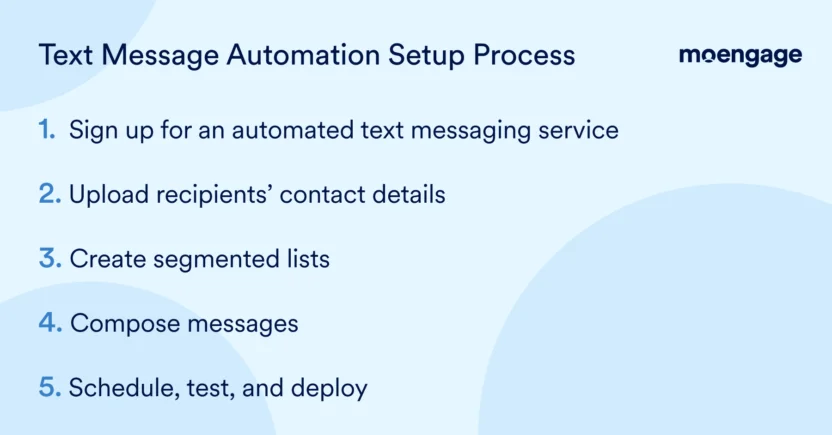
Setting up SMS marketing automation is easy and can be accomplished in just 5 steps, as listed below.
1. Sign up for an automated text messaging service
To begin your automated text messaging campaign, you would first need to select a platform that meets your requirements. It would be wise to pick a service that allows you to automate end-to-end workflows and empower your team.
2. Upload recipients’ contact details
Next, upload the contact details of those who have opted to receive your texts. You can either drag your contact file onto the page or browse for it to upload it. Remember, just having the recipients’ phone numbers doesn’t mean you can start sending them SMS messages right away. They need to explicitly give you their consent first.
3. Create segmented lists
Create segmented groups of recipients based on criteria such as demographics, customer type, and so on. This can help your brand send automated text messages to relevant audiences and raise the chances of engagement.
4. Compose messages
This step can be highly crucial as the content of your SMS can make or break your connection with your customer. Leveraging data can help with hyper-personalizing your communication. Typically, a crisp message with a relevant CTA could boost your click-through rates.
5. Schedule, test, and deploy
Once your text messages are ready, it’s time to set up a schedule to send them. Some messages may be on specific recurring dates like birthdays, while some may be triggered by certain customer actions like cart abandonment. Finally, don’t forget to test your SMS marketing automation before you deploy it!
5 Automated Text Message Examples and Templates for Campaign Inspiration
Now that you know how to set up automated text messages for business, let’s get some much-needed inspiration for creating your own successful SMS marketing campaigns.
1. Lulus | Promoting Offers and Deals
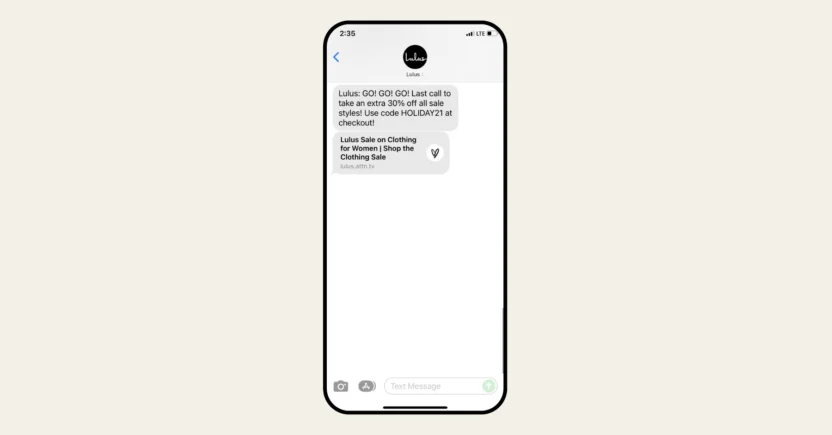
Source: https://smsarchives.com/messages/lulus-text-message-marketing-example-12-31-2021/
Notice how women’s wear brand Lulus strategically uses automated SMS marketing to remind customers of their ongoing holiday sale, with a link to finish the purchase.
In this case, automation helps deliver personalized deals to customers who may have earlier browsed through the brand’s website. For those who dropped off the website due to the absence of offers, this SMS can work as a smart nudge to complete that purchase.
2. Old Navy | Wishing Customers on Special Days
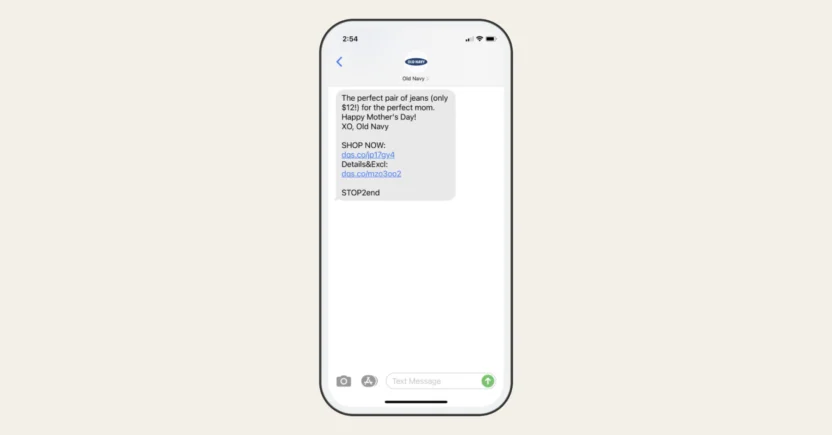
Source: https://smsarchives.com/messages/old-navy-text-message-marketing-example-05-09-2021/
In the example above, Old Navy not only wishes its customers Happy Mother’s Day, but also goes a step further in offering deals on women’s wear.
In this case, an automated text message could be used to narrow the target audience to women who are or could be mothers. This also includes wishing them on their special days.
3. Gaspar | Appointment Confirmation and Reminders
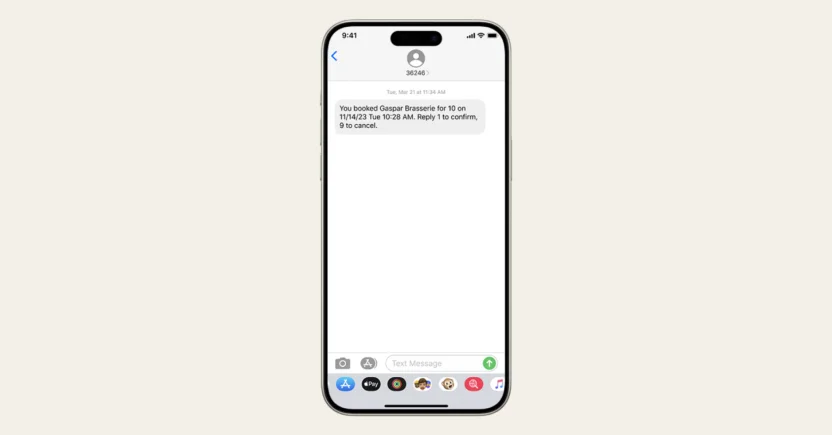
A practical use of automated text messages for business is to confirm appointment reservations and get a response from the customer if they are willing to make changes. To elevate the experience further, the brand could add options to reschedule or cancel the reservation on the SMS itself, using automated text messaging.
4. Amazon | Shipping and Tracking
![]()
Source: https://www.wonderment.com/hubfs/Wonderment_September2021/image/amazon_sms_shipping_alerts_w720.jpg
This template ticks all the boxes for a well-crafted automated text message for business. Amazon informs the customer of the product name, expected date, and order status, along with the tracking link. These kinds of informative messages tend to be super useful to customers.
5. The Perfect Jean | Retargeting via Cart Abandonment Messages
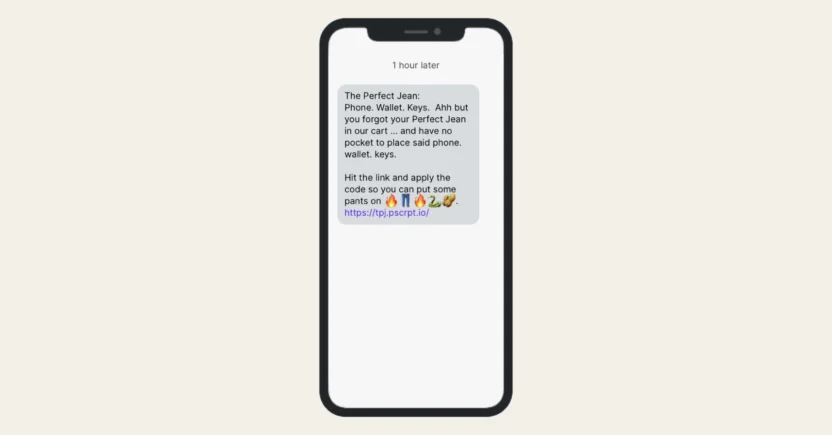
This automated text message example can serve as a model template for cart abandonment notifications. The brand reminds the customer of the items left in the cart and encourages the purchase by offering a custom discount code and a link to complete the purchase.
Top 3 Automated Text Message Services for Businesses
SMS marketing automation can be simple to set up with the right tools. Here are some leading services that can help you send automated text messages to your customer base.
1. MoEngage
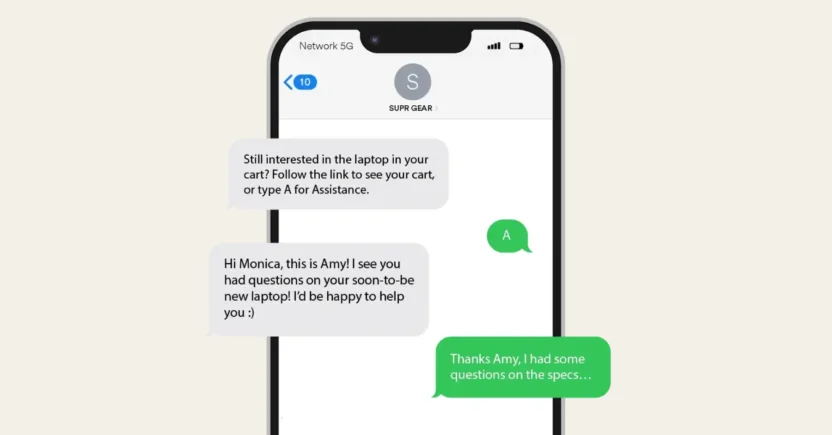
MoEngage’s SMS automation software can make targeted SMS campaigns seem like a breeze with ready-to-use campaign ideas, hyper-personalized messaging, and 360-degree customer views.
Standout SMS Automation Feature: MoEngage’s automated text message marketing service stands out for its ability to integrate SMS into the overall customer journey and deliver insight-led, revenue-driven campaigns.
How Pricing Works: Schedule a demo to know which of the two pricing plans works best for your business.
2. Textedly
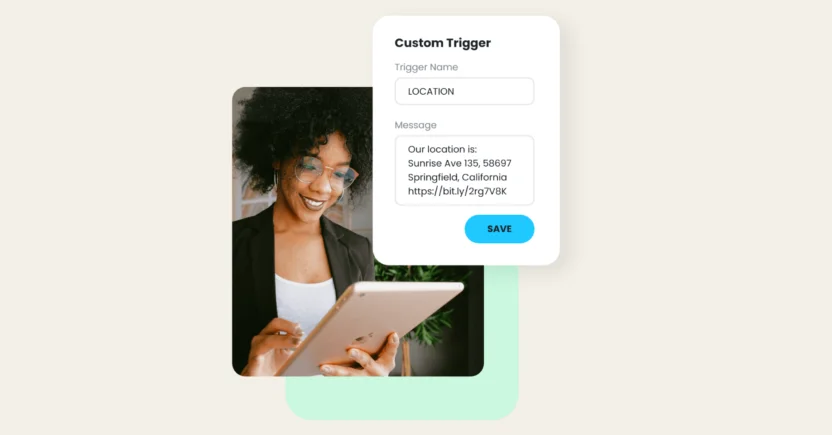
Textedly offers an easy-to-use automated text message software for real-time conversations with your customers. However, it lags behind in providing an omnichannel brand experience.
Standout SMS Automation Feature: The service has an intuitive platform and also a shared team inbox to ensure timely automated responses for instant customer support.
How Pricing Works: While the service offers a free plan with limited features, the basic plan starts at $26 a month and varies for other advanced plans.
3. Sender
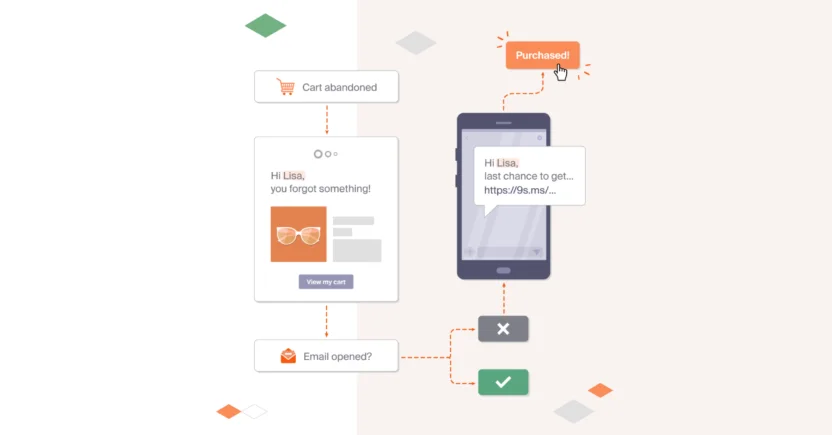
Sender enables SMS automation campaigns for bulk, personalized messages to customers.
Standout SMS Automation Feature: Sender is an automated SMS software that offers affordable, easy-to-use templates for automating text messaging campaigns. However, it is limited to email and text message services, and does not offer integrated engagement solutions as part of the overall customer experience.
How Pricing Works: Sender offers a free plan, with paid plans starting at $10 a month.
SMS Marketing Automation Strategies That Improve Campaign Performance
Sure, you may be excited to launch your own automated SMS campaign. But hold on! There’s so much more you can get from automated text messaging, with some practical SMS marketing automation strategies listed below.
1. Make your automated text message conversational and interactive
Customers love it when their brands are responsive to their needs! Using automated SMS services, you can make your text messages conversational. For instance, you can ask a series of questions to help customers reach informed decisions regarding your product or service.
2. Always ask for consent
Before blasting automated text messages to your customers, it’s best to get their consent. Clear opt-in and opt-out options are necessary not only from a legal standpoint but also from the transparency angle.
3. Segment and personalize for your customer
Nobody likes a random brand message that could be sent to just about anyone. You can use customer demographic and behavioral data to segment your customers into different groups. Armed with better insights, you can send more targeted and personalized text messages to your customers.
4. Grow your subscriber list with incentives
Customers would be happy to consent to receiving your brand’s messages if they are offered something in return. Weaving smart opt-in messages with exclusive promotional deals and other perks can grow your subscriber base.
5. Review the little things
A text message is one of the quickest ways to reach a customer. When done right, it can work wonders for your brand! But before you hurry to send out texts, remember to include crucial elements like a crisp main message, a valuable offer, a strong CTA, and a link to access the relevant offers or information. Finally, don’t forget to do automated SMS testing before sending the SMS.
Enhance Your Outreach with Automated SMS Marketing from MoEngage
Brands can use the small but mighty SMS in many ways to deepen customer engagement. However, it is important to get subscriber consent and use other best practices to make the most of automated SMS marketing.
MoEngage’s SMS marketing platform can help you have smoother interactions with your customers guided by detailed analytics, as part of a seamless omnichannel journey.
Get a personalized demo to know how MoEngage can help you tap the massive potential of automated text messaging.

